Summer Research Forum 2025 Highlights
20.08.2025
On Friday, 25 July 2025, the Rachel Carson Center (RCC) marked the end of yet another academic term with the Summer Research Forum.
Hosted by the RCC twice a year, the Research Forum is a public event that brings together the large yet cozy RCC community including fellows, visiting scholars, students, and guest speakers to celebrate and inspire new research at the RCC.
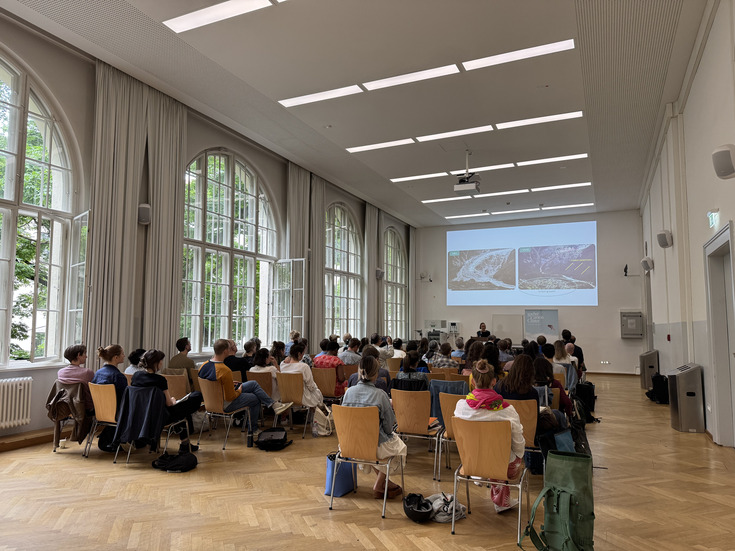
Audience at the Research Forum. Photograph by Nil Özleyen.
The event has consistently fostered an atmosphere of productive exchange and stimulation—and this year was no exception. Held at LMU’s main building, the forum opened with a brief welcome and introduction by Director Christof Mauch and Managing Director Lena Engel, reminding us once again of the event’s unique role in promoting diversity in academia and encouraging collaboration.
Following this warm welcome, Lena Engel introduced the forum’s dense and ambitious program, featuring a total of 36 speakers. To help keep the schedule on track, she also presented the forum’s traditional Cowbell Award, given to the speaker who comes closest to the five-minute time limit without exceeding it.
The stage was then handed over to Francesca Biagini, LMU Vice President for International Affairs and Diversity, who congratulated the RCC community on yet another semester of fruitful research and collaboration. With the introductions concluded, the first panel highlighting current research projects at the RCC began under the moderation of Anna-Maria Walter.
Panel I: Research Projects at the RCC
This panel set the tone of the forum by showcasing a range of approaches to environmental research carried out at the RCC. Drawing from anthropology, environmental history, natural sciences, and much more, the presentations offered a crossdisciplinary perspective on ecological issues.
Kim Förster, substitute professor from University of Manchester, opened with his research project on exploring the global history of cement. The panel continued with contributions from Paolo Gruppuso, Jan David Hauck, Davide Orsini, and Miles Powell on different research topics and approaches.
Together, these presentations highlighted the RCC’s commitment to interdisciplinary research and offered new perspectives.
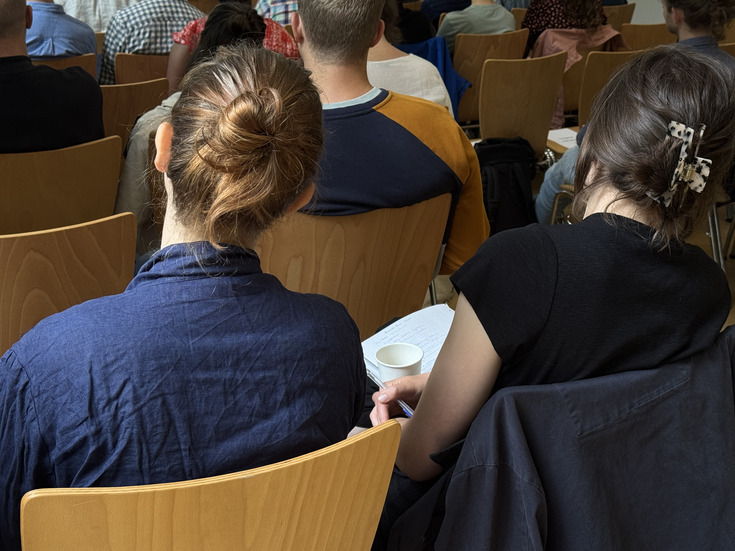
Students taking notes at the Research Forum. Photograph by Nil Özleyen.
Panel II: Visiting Scholars from Around the Globe
The second panel expanded the focus beyond Munich with the help of RCC’s visiting scholars bringing insights from around the globe. Moderated by Christof Mauch, the panel began with a presentation by Cao Mu from Nankai University (China) whose research explores the industrial rise of the city of Tianjin as a result of its surrounding waterways.
Further insights came from France, Italy, the US, India, and Austria with contributing presenters Florie Giacona, Marco Ettore Grasso, Seth Peabody, Rossana Pennazio, Kaushik Ramu, Quirin Rieder, Tian Song, and Charles Trautmann.
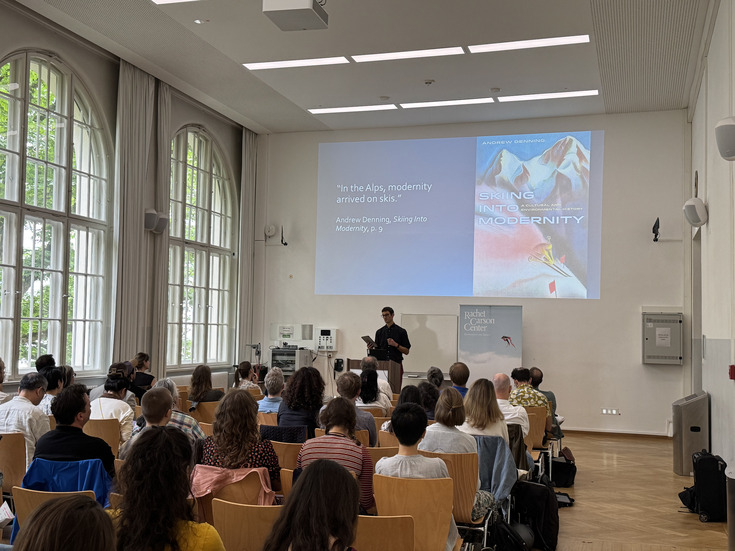
Seth Peabody (Carleton College) presenting on “Heights (and Depths) of Modernity: Rethinking Environmental Humanities in the Alps.” Photograph by Nil Özleyen.
A lunch break followed the two panels, offering a chance to refuel, connect with fellow participants, and digest the ideas shared throughout the morning. Lunch was served at the Speerträgerbereich, overlooking the atrium’s skylight dome and surrounded by beautiful architecture and monuments.
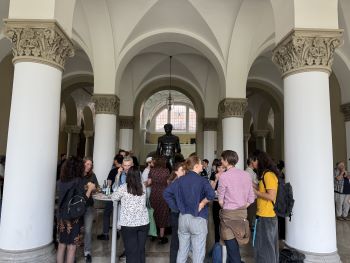
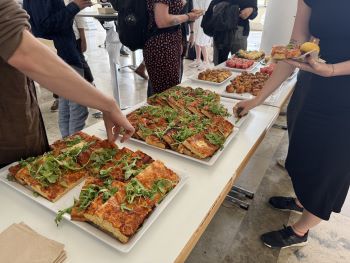
Lunch at the Speerträgerbereich. Photographs by Nil Özleyen.
After the break, Pauline Kargruber and Haley Snyder from the Editorial and Communications Team gave a quick update on the most recent additions to the RCC publications Springs: The Rachel Carson Center Review and Seeing the Woods: A Rachel Carson Center Ecopedia, as well as updates on the Environment & Society Portal including the new virtual exhibition “Once Upon a Dune: Coastal (Hi)Stories.”
Panel III: Reports from the Field
The program resumed with reports from the field. Moderated by Lena Engel, this session featured the two speakers Katie Kung and Yuxi Xia, who shared results from their field research. Kung conducted fieldwork in New Zealand, where she explored the complex discourse around invasive species. Xia spent an entire year traveling Japan, Vietnam, Thailand, Malaysia, Indonesia, Turkey, Italy, Bulgaria, Austria, and Switzerland to investigate vegan foodscapes across diverse cultural and geographic contexts.
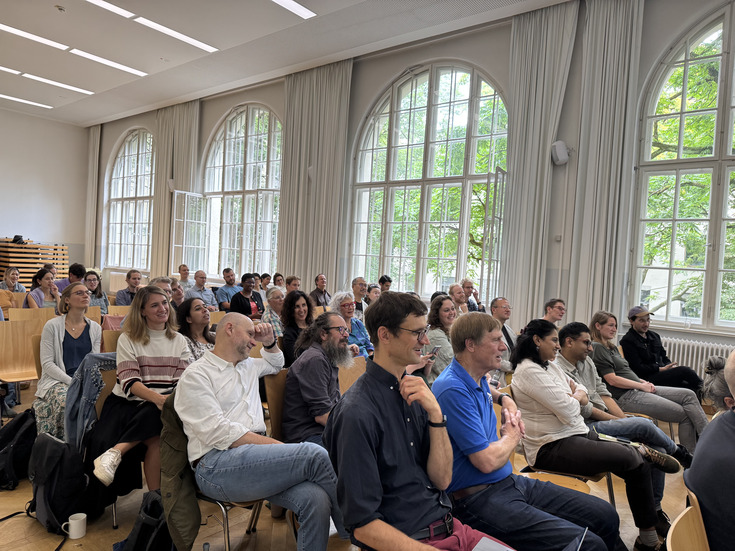
Audience at the Research Forum. Photograph by Nil Özleyen.
Panel IV: Introducing the Landhaus
The fourth panel welcomed the Landhaus Fellows to the stage, marking a significant moment as they represent the final cohort to live and work at the RCC Landhaus residence located on an ecological farm just outside the city.
In this special section, the fellows shared personal reflections on their time at the Landhaus, sharing a variety of photos, videos, and anecdotes captured during their stay. Their time together fostered a strong sense of community and led to a productive period of research and exchange.
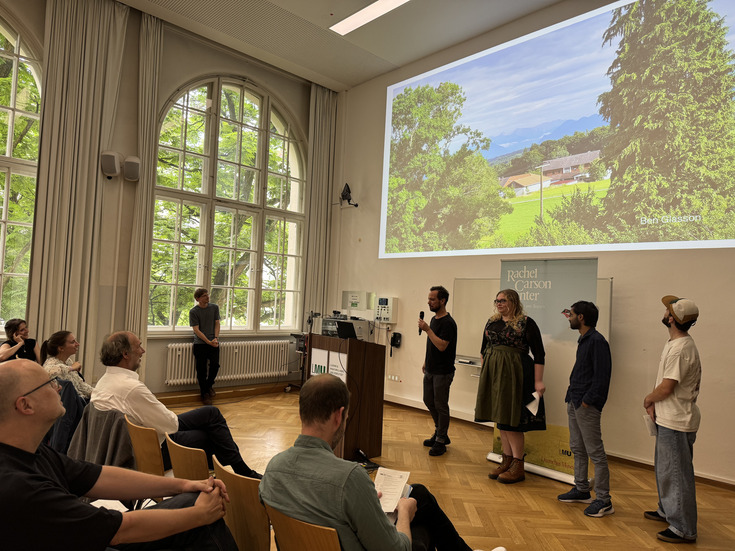
Ben Glasson sharing pictures from the Landhaus. Photograph by Nil Özleyen.
The panel was moderated by Moremi Zeil who served as the Landhaus manager. In recognition of his dedication and care for the program, Moremi received a heartfelt farewell and special thanks from the RCC directors closing the session on a bittersweet note.
Panel V: New Doctoral Research at the RCC
The final panel offered a glimpse into the next generation of environmental scholarship with the presentation of new doctoral research at the RCC. Sonja Dümpelmann, co-director and chair of the environmental humanities at LMU Munich, led the session and invited Adrienne Brown and Markos Panayiotou to present their PhD research.
Certificate Students: Final Projects & Awards Ceremony
As part of the event, students from the Environmental Studies Certificate Program at the RCC had the opportunity to present their final projects and receive their certificates of completion. Under the direction of program coordinator Susanne Unger, students shared their work, showcasing a wide range of creative and practice-oriented approaches.
Project topics included hands-on guides to urban gardening, AI-generated representations of nature, and the upcycling of garments to reduce textile waste. This session offered a less traditional academic format, but one that was no less valid demonstrating imaginative responses to ecological challenges.
Just before the event wrapped up, Lena Engel took the stage once more to reveal the winner of the coveted Cowbell Award—doctoral candidate Adrienne Brown, recognized for her almost perfectly timed presentation.
The forum then concluded with coffee and cake, giving everyone a chance to unwind after a packed day of exchanging thoughts and ideas.
A heartfelt thank you goes out to everyone who helped make this exceptional event possible—from the organizers and speakers to the staff and interns.
Report written by Nil Özleyen.

